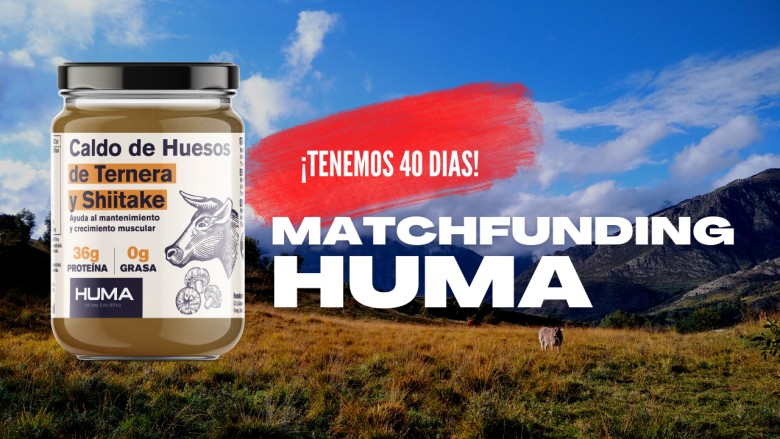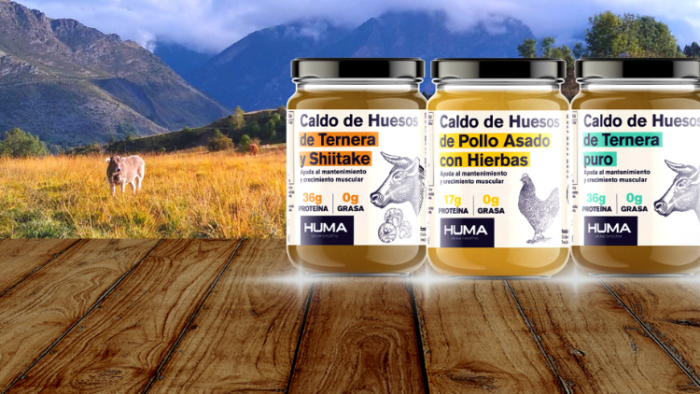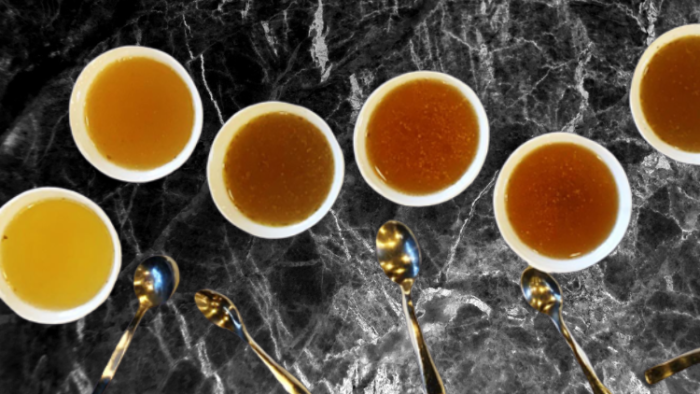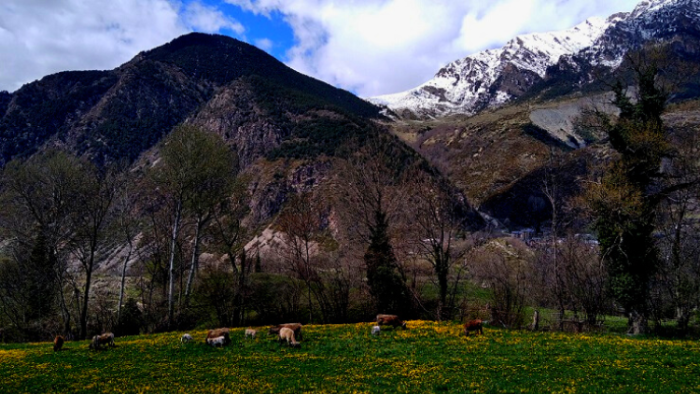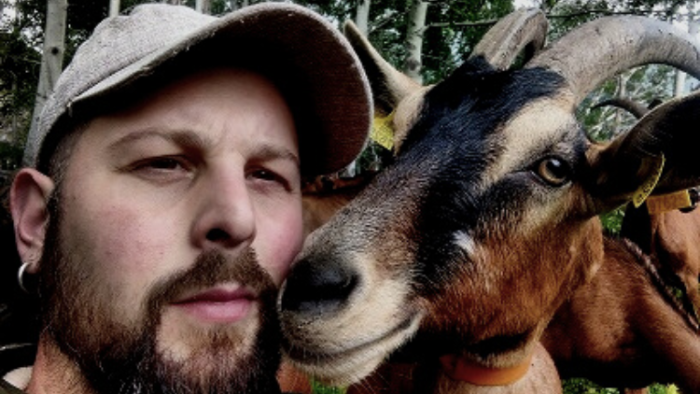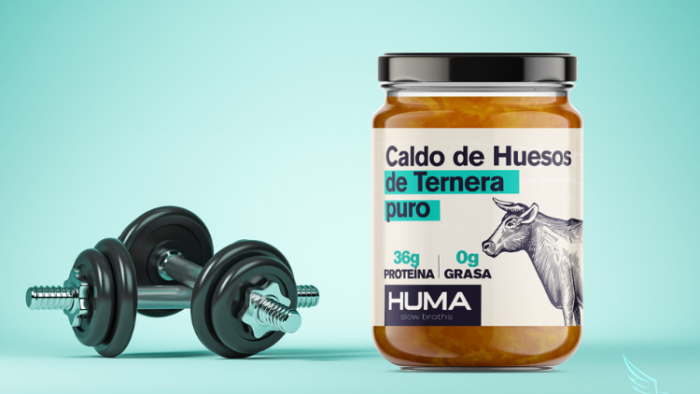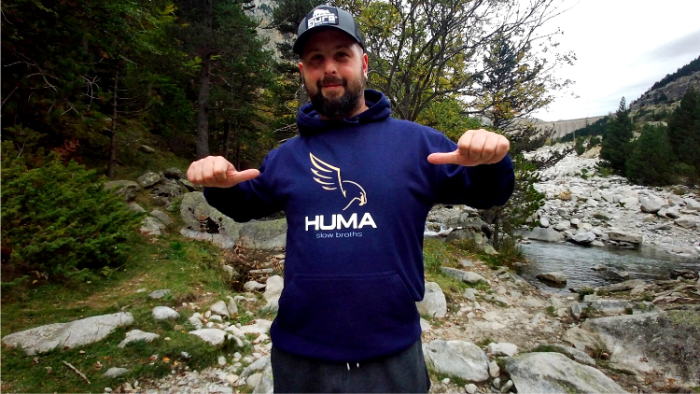> We toast beef bones🍖, add water💧 and for more than 12 hours⏳, we let them gradually get to know each other over very, very low heat. At some point, the vegetables will be incorporated🥕 and at the end, the pinch of salt , to finish flavoring our bone broth🍵

Is there a better way to explain what bone broth is than by summarizing the recipe?
I am Rubén, a chef by profession for 16 years and the last two I have dedicated, together with the support of my wife Cris and the encouragement of my son Odin, to building this project that is HUMA slow broths.
In June 2018, my wife and I closed our restaurant in Barcelona and we decided to move to Vall de Boí.
The Vall de Boí, like many places in the Pyrenees, lives mainly from two activities: tourism and livestock, the latter, unfortunately, in regression and both closely linked to the Parc Nacional d'Aigüestortes.

Just over two years ago, and especially during confinement, I decided to leave the hotel industry, like many others, but without wanting to leave the kitchen.
I bet then, for being useful and wanting to contribute something of value to this territory that has welcomed me, developing a product that allows me and the future team to have work all year round, without depending on the tourist seasons and being able to help maintain that activity that has shaped, cared for and maintained this landscape, such as extensive livestock farming.
And that is what HUMA slow broth intends. Thanks to the circular economy 🔄 and the principles of 0 waste and Km0, we want to offer a highly nutritious food, from a "waste" such as bones , thus obtaining the first bone broth with ECO certification, made in the Pyrenees, with products from the Pyrenees.
One of the main characteristics and one that makes me most excited is that our broth is made with raw materials from my territory. From the water 💧 that comes out of the springs of Caldes de Boí like the bones, which are from the cows 🐮 of Ca d'Alguaira, Farré d'Avall, Ramón, Martí, Marc, Jaume . Animals that graze freely in the Parc Nacional d'Aigüestortes for much of the year, until the cold winter arrives.
OK, but how is bone broth different from regular broth? Why is it functional?
The main difference between the two is basically the cooking time and the method.
Conventional broth:
👉 All ingredients together
👉 Water boils
👉 Relatively little cooking time
👉 Tasty and nutritious infusion, but rich in carbohydrates and sugars
HUMA Bone Broth:
🦴 Ingredients go into different phases
🦴The water never boils, we cook in simmering
🦴Minimum 12 hours of cooking
🦴Tasty, nutritious broth, 0 carbohydrates, 0 sugars, 0 fats and high protein content.
📋Four figures to understand a little more:
An adult person according to CDR needs 0.8 grams of protein per kilo of weight . This is according to the Recommended Daily Amount, an amount introduced during World War II, due to shortages and rationing, and which has not been updated to date. Optimally we would need about 1.5 grams since our physical activity requires it and even then we would fall short.
An athlete needs between 2 and 2.5g per kg of weight depending on the type of exercise they perform.
Older people , need to feed with greater amount of protein of rapid absorption as their muscle wear is greater and their ability to regenerate muscle is limited.
❓ We talk a lot about gluten or lactose intolerance, but how many people know about LTP Syndrome? LTP syndrome is an allergy to Lipid Transmission Proteins, a protein found in vegetables and which is the main cause of food allergies and food anaphylaxis in the Mediterranean population. Therefore, all people who suffer from this allergy cannot consume any type of broth, soup or consommé that is prepared in stores because they all contain vegetables.
Functionality is achieved thanks to the long cooking time and the cooking process, thus achieving the extraction of all the nutrients from the bones, such as essential and non-essential amino acids such as glycine, proline and lysine or proteins such as collagen. or glucosamine.
These proteins and amino acids, in certain amounts, help repair and rebuild muscles, help us repair leaky gut, colon pathologies...
I have been lucky enough to be able to count on the collaboration of the Fundació Alicia throughout the R&D process, creating the prototypes and the different recipes so that we can reach the values that science and regulatory bodies force us to achieve (minimum 12% of the energy value) to be able to say that our broth is functional. And we can say that: we have achieved it!

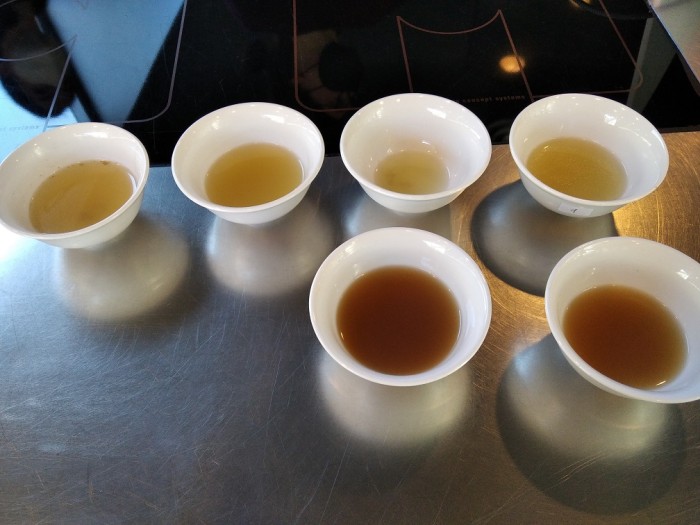
So among all the prototypes that were cooked, 16 in total, we selected two and one that I added later, which I will now explain to you:
🐮🍄 Beef and shiitake: This broth, with an intense meat flavor, is also cooked with cabbage, carrot, leek and shiitake, an Asian mushroom that we add fresh and that gives it a very interesting point of umami.
🐮Pure beef: In this case, a more intense meat-flavored broth, where there are only beef bones, water and a pinch of apple cider vinegar, to reinforce the extraction of more minerals and suitable for people suffering from LTP .
🐔🌿 Herb Roasted Chicken: Broth made from carcasses we roast in the oven and cleaned chicken feet. Then we add the vegetables and some herbs that give the roast chicken a special touch such as laurel, rosemary, cinnamon...
Then, they all go through an autoclave sterilization process, in order to extend their useful life, without adding preservatives, acids or anything that alters the original flavor of each recipe. Note that the thermal process does not volatilize the proteins and minerals in the broth, so the nutritional values we seek are not altered.

What we want to achieve:
✔️ Innovate: Because we are the first bone broth producer almost 100% protein in the entire Peninsula.
✔️ Give value to a by-product and avoid food waste since bones that would end up in an incinerator, we manage to create fast-absorbing nutritious foods
✔️ Boost the economy of the territory and create synergies between different actors in the area, managing to create timeless jobs and establishing population in the region.
✔️ Export another way of knowing the territory, our landscape and our culture, helping to maintain an activity such as extensive livestock, which maintains the landscape, regenerates soils, prevents fires and, in a certain way, feeds back to other economic sectors, like tourism.
✔️ Cover an unresolved need such as athletes, people who carry out specific diets such as keto, lowcarb, paleo, intermittent fasting or people with specific nutritional needs, such as the elderly who need fast-absorbing protein or people with irritable bowel , did not have this product within their reach, having to make it themselves with the consequent expense in raw material, energy and time, how many people cook broth for more than 12 hours at home?
✔️ Collaborate in specific food programs related to health. Example: Alicia Foundation ketogenic diet program for children with epilepsy, where bone broth is essential, to obtain vitamins and minerals that we stop obtaining by suppressing carbohydrates carbon.
✔️ Participate in bearded vulture conservation programs, the image of our project for being a unique bird, a symbol of the Pyrenees, in danger of extinction, and that bases its diet on bones and cartilage.

To achieve all the objectives we need your help!
Thanks to your donations, we will be able to:
Start cooking the first productions at a higher level, in order to meet the current high demand for bone broth. We will go from the 80-liter pot, where we have done the tests, to a 600-liter pot, in order to optimize time and energy consumption. For this we will need to buy large quantities of bones, carcasses, legs... as well as organic vegetables and water.
On the other hand, we need to stock up on more glass jars. We currently have a pallet and we want to buy another, in anticipation of rising glass costs. For information: Less than two years ago, we were budgeted for the pallet at €550. A year later, we have paid it to €927 and we have just received an email of a 20% increase from October.
We will also buy the boxes to send you the broth to your homes and to the collection and distribution points.
But for this, before, we will need our ecommerce website. We will start with a simpler model and if we reach the optimum, we will create a super dynamic and optimized ecommerce.
And if we reach the optimum and exceed it, we will buy a second-hand van, to be able to make the closest deliveries, since the distances and access to the region make the normal rhythm of the courier service difficult and the costs for shipping are also high.
Our life model leads us to rush, cook little and buy food that may satisfy us when we eat it, but are they nutritionally good? Is buying a brick of "broth" really feeding us? Do we take into account people who, like everyone else, don't have time, but their nutritional needs are different or more specific and what they find quickly in the supermarket is of no use or harms them?
When I started the whole process of reconnecting with the kitchens, after my "heartbreak" for the hospitality industry in 2019, I didn't know whether to make stews, soups... so I started to investigate what I could offer different from everything that is in the supermarket shelves, taking into account my principles and asking myself all those questions.
In that search, I discovered bone broth, a food with a very ancient base, of reuse and that, in northern Europe and the US, has been in great demand for years and here we hardly find it.

Who is the project for?
We could say that it is an exclusive product for all the groups that I have mentioned above, but obviously not.
HUMA is a rich and good broth for everyone. So if you care about your health and your diet, you want to eat healthy and you feel identified with the values that I have mentioned, it is clear that HUMA slow broth is also for you.
The one who writes all this to you, Rubén, I have been a cook since I left the catering school of the IES Martí Dot in Sant Feliu de Llobregat, in 2006, being the first promotion of the center.
Since then, I have worked in all kinds of kitchens, both in restaurants, hotels and communities.
In 2015, together with my wife, we founded La taverna dels 11. A small restaurant, without tables and with 11 stools, where for 3 years we happily fed everyone who passed by, some of whom have ended up being friends and almost family.
In 2019 burned out from the hotel business, I dedicate two years of my new life as a "neorural", to being a goatherd, grazing and milking, a herd of 200 alpine goats, in the Taüll Formatgeria.
In 2021, coinciding with the confinement, I took the Agri-Food Transformation course of the Escola Agraria de Monells (Empordà) online, with the intention of developing this project, which I had already had in mind for a year, but I was missing knowledge about construction sites and sanitary legality.
The initial team, basically me, with the intention of hiring 2-3 people between the first and second year, also counting on the collaboration of the Fundació Cooperativa Alba Jussà, an organization that works for the employment of people at risk of social exclusion, especially with mental or behavioral health problems, multi-disability and aging, in order to help all kinds of people to have a dignified and normal life.

